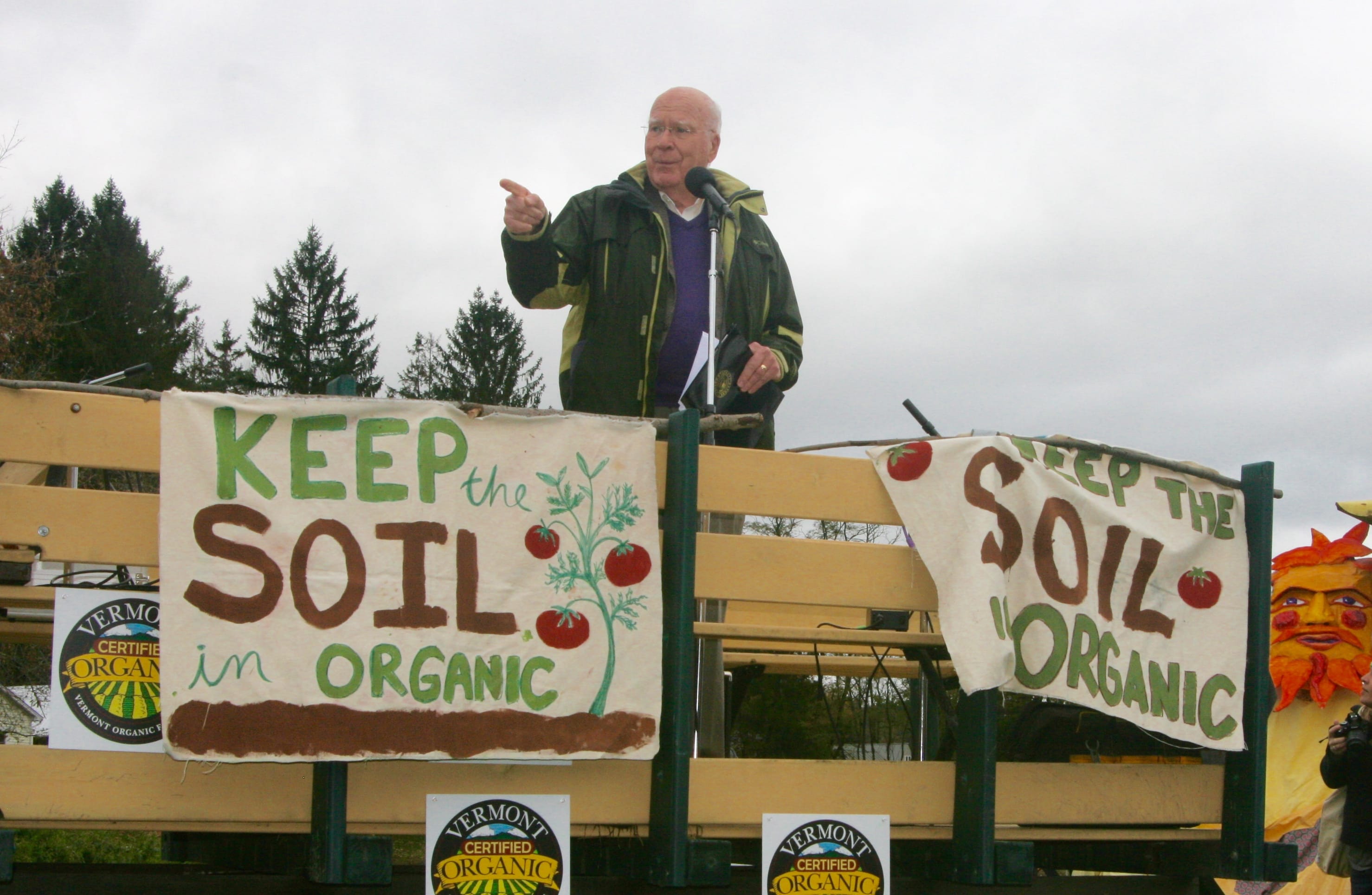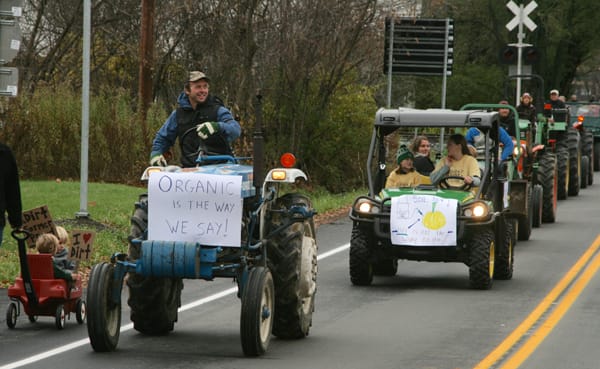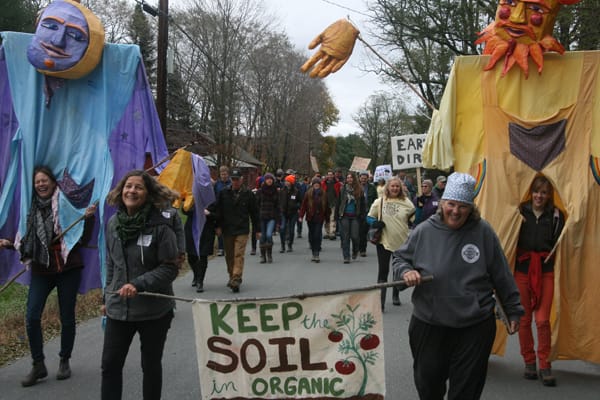“Organic without soil is like democracy without people.”
Organic farmers from all over New England rallied in Vermont on Sunday, October 30, to protest the eroding organic standards of the USDA—particularly the federal government’s decision to permit labeling of hydroponic fruits and vegetables as “organic.”
 |
U.S. Senator Patrick Leahy, a long time champion of the organic farming movement, challenged the crowd to keep the pressure on the Department of Agriculture. “I know the fight we had to go through to get the original organic regulations passed,” he said. “The Organic Food Production Act is one of my proudest pieces of legislation. Every so often someone will try to undercut it. We know what grown in the soil means, and we know what hydroponic means. I want ‘organic’ to mean organic! ”
The US government is alone among developed countries in granting the much-desired “organic” label to hydroponic growing. Hydroponic production is a soil-less process that has long been the norm in conventional greenhouse production. Now it is fast becoming the norm in organic certification for several major crops, such as tomatoes and berries.
 |
David Zuckerman speaking |
Hydro plants are fed via fertilized irrigation water. This process has long been embraced by conventional greenhouse producers for its simplicity, high yields, and low costs. Experts say the explosive growth in hydroponic imports may force some organic farmers out of business in as little as five years.
Vermonter Dave Chapman, an organic tomato farmer who served on the USDA Hydroponic Task Force, told the crowd that the hydroponic incursion has become an “invasion,” as more and more hydroponic producers from around the world discover that they can now gain access to America’s coveted organic market.
Peppers from Dutch greenhouses that could never be certified as organic in Holland become “organic” when they cross the border, Chapman explained. Hydroponic lettuce and tomatoes from Mexico and Canada are now pouring into the US. Driscoll’s, the world’s largest berry grower, now has over 1000 acres of hydroponic berry production.
“The Federal standards are being taken over by the hydroponics industry,” said Chapman, who noted that Driscoll’s is now one of the most powerful voices on the National Organic Program. “Unless we can fight back, ‘organic’ will soon become meaningless. This hydroponic invasion has been almost invisible to the farmers and eaters of America, as no hydroponic food is labeled as such. The more that I learned serving on the USDA Task Force, the worse it got. Who knew that over 1000 acres of Driscoll’s “organic” berries were actually hydroponic? None of us knew.”
 |
Pete’s Greens |
The Rally began with a 26-tractor cavalcade that started at Long Wind Farm in East Thetford, VT, and rolled slowly to nearby Cedar Circle Farm. “Keep the Soil in Organic” and “Take Back Organic” were among the hand-made signs that marchers carried as they sang to onlookers. Twelve-foot-tall puppets made by Vermont’s Bread and Puppet Circus, depicting the sun and the moon, led the way.
“Organic has always meant grown in the soil,” Eliot Coleman, an influential author and spokesman for the organic farming movement in the U.S., told the crowd. “We refuse to let the promise of organic agriculture be compromised by profiteers. We have won before and we will win again.”
Renewing the soil without pesticides or chemical fertilizers is also one of the few solutions to global warning, noted Will Allen, owner of Cedar Circle Farm and author of 2008 anti-pesticide manifesto, The War on Bugs. (Allen recently received an award from Politico for his organizing work on GMO labeling.) “Regeneration is trying to take emissions that have already been produced and put them back in the soil. Our soils are our single biggest sink for carbon so that we can actually fix climate change by taking all those greenhouse gasses and putting them back in our soils, and we know we can do that with organic farming.”
“We can be the solution to climate change,” Allen said. “How are we going to sequester carbon in water? Hydroponics is going backwards.”
Agrarian Elder Jake Guest looked back on his many years as an organic vegetable farmer. He recalled composing the first Northeast Organic Farming Association organic standards by the light of a kerosene lamp many years ago. As he wrote those standards, he was surrounded by the books written by earlier organic pioneers such as Albert Howard, Eve Balfour, Rodale, and Albrecht. “They all wrote about soil as the basis for organic farming. We have a right to the word organic. This hydroponic bullshit is a perversion.”
“We’ve come to call the materials we can use in organic production as ‘amendments’, which according to Webster means ‘materials that aid plant growth indirectly by improving the condition of the soil.’ It is such a bizarre concept that you can take what we call ‘amendments’ and make it the whole system.”
In recent years, hydroponic facilities have found a way to obtain organic certification, despite growing in a way that defies the essence of organic farming: “Feed the soil, not the plant.” That motto captures the philosophical difference between conventional agriculture, which focuses on supplying the needs of the plant, versus organic farming, which focuses on supplying the needs of the soil.
 |
Executive Director of NOFA VT and organic farmer Kate Duesterberg of Cedar Circle Farm |
Organic farmers believe that a healthy soil community, with myriad species of large and small organisms, and a blend of mineral and organic materials, provides plants with what they need for true health. In an organic system, plants are not passive consumers of fertilizers, but are dynamic energy sources that, through photosynthesis, provide food for the many soil organisms that in turn feed the plants.
Most hydroponic production facilities in the U.S. were started after the 2010 recommendation from the National Organic Standards Board (the advisory board to the USDA) that called for excluding all hydroponics from the organic label.
And yet, since that 2010 recommendation, the USDA has welcomed all hydroponic production into the organic certification program, going so far as to issue a clarifying statement in 2014 that hydroponic production qualifies as organic if the companies use “permitted” fertilizers.

